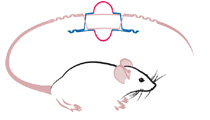Last updated: May 08, 2012
NIH Awards Nearly $5 Million to Fund Knockout Mouse Repository

National Human Genome Research Institute
www.genome.gov
NIH Awards Nearly $5 Million to Fund Knockout Mouse Repository
Increased Availability of Genetically Altered Mice Will Aid Studies of Human Diseases
 Bethesda, Md., Tues., June 26, 2007 - The National Institutes of Health (NIH) announced today it will provide $4.8 million to establish and support a repository for its Knockout Mouse Project. This award is the final component of a more than $50 million trans-NIH initiative to increase the availability of genetically altered mice and related materials. The University of California, Davis (UC Davis) and Children's Hospital Oakland Research Institute (CHORI) in Oakland, Calif., will collaborate to preserve, protect, and make available about 8,500 types of knockout mice and related products available to the research community.
Bethesda, Md., Tues., June 26, 2007 - The National Institutes of Health (NIH) announced today it will provide $4.8 million to establish and support a repository for its Knockout Mouse Project. This award is the final component of a more than $50 million trans-NIH initiative to increase the availability of genetically altered mice and related materials. The University of California, Davis (UC Davis) and Children's Hospital Oakland Research Institute (CHORI) in Oakland, Calif., will collaborate to preserve, protect, and make available about 8,500 types of knockout mice and related products available to the research community.
"Knockout mice are useful tools that allow researchers to study human conditions such as cancer, diabetes, and Alzheimer's disease and then translate discoveries into cures and treatments that will improve public health," according to Barbara Alving, M.D., Director of the National Center for Research Resources, the NIH component that is leading the repository effort. "This initiative will ensure knockout mouse strains are made available to the research community in an economical and timely manner."
Knockout mice are lines of mice in which specific genes have been completely disrupted, or knocked out. Systematic disruption of each of the 20,000 genes in the mouse genome will allow researchers to determine the role of each gene in normal physiology and development. More importantly, researchers can use knockout mice to develop better models of many inherited human diseases. Recent advances in DNA technologies, as well as completion of the mouse genome sequence, now make this project feasible.
The repository will archive, maintain, and distribute up to 8,500 strains of embryonic stem cell clones, live mouse lines, frozen embryos and sperm, and vectors - while assuring product quality and availability for all materials. The four-year grant funds establishment and operation of the repository.
"This repository will enable many more researchers to access knockout mice, which are valuable models of human disease," said Colin Fletcher, Ph.D., a program director at the National Human Genome Research Institute (NHGRI), which is the administrative lead for KOMP. "Establishing this final component of the Knockout Mouse Project is an important milestone in progressing toward our goal of making a comprehensive resource of knockout mutations in the mouse genome publicly available to the research community."
"As veterinary scientists, we are proud of our longstanding partnership with the NIH," said Bennie Osburn, dean of the School of Veterinary Medicine at UC Davis. "This important project builds on our reputation as a resource for genetically altered mice, which are essential models for furthering our understanding of human and animal disease."
Previously funded portions of the KOMP include two awards totaling $47.2 million for the creation of mouse embryonic stem cell lines in which 8,500 different genes have been knocked out. Recipients were Regeneron Pharmaceuticals, Inc., and a collaborative team from UC Davis, CHORI, and the Wellcome Trust Sanger Institute in England. NIH also supported the establishment of a data coordination center by the Jackson Laboratory in Bar Harbor, Maine, to track the scheduling and progress of knockout production. In addition, NIH issued smaller awards to the University of Pennsylvania and the Samuel Lunenfeld Research Institute of Mount Sinai Hospital in Toronto to improve the efficiency of methods for creating knockout lines.
The repository project is being funded by NCRR, NHGRI, and the National Institute of Allergy and Infectious Diseases. In addition to those three NIH components, the overall Knockout Mouse Project is being supported by the National Eye Institute; National Heart, Lung and Blood Institute; National Institute on Aging; National Institute of Alcohol Abuse and Alcoholism; National Institute of Arthritis and Musculoskeletal and Skin Diseases; National Institute of Child Health and Human Development; National Institute on Deafness and Other Communication Disorders; National Institute of Dental and Craniofacial Research, National Institute on Drug Abuse; National Institute of Environmental Health Sciences; National Institute of General Medical Sciences; National Institute of Mental Health; National Institute of Neurological Disorders and Stroke; National Institute of Diabetes and Digestive and Kidney Disease; National Cancer Institute; and the Office of AIDS Research.
More information about the KOMP resources is available at www.komp.org. To request information or products, researchers can call 1-888-KOMP-MICE or e-mail service@komp.org.
The National Institutes of Health (NIH) - The Nation's Medical Research Agency - includes 27 Institutes and Centers and is a component of the U.S. Department of Health and Human Services. It is the primary federal agency for conducting and supporting basic, clinical and translational medical research, and it investigates the causes, treatments, and cures for both common and rare diseases. For more information about NIH and its programs, visit www.nih.gov.
Contact:
Ann Puderbaugh
NCRR
301-435-0888
puderba@mail.nih.gov
Geoff Spencer
NHGRI
301-402-0911
spencerg@mail.nih.gov
